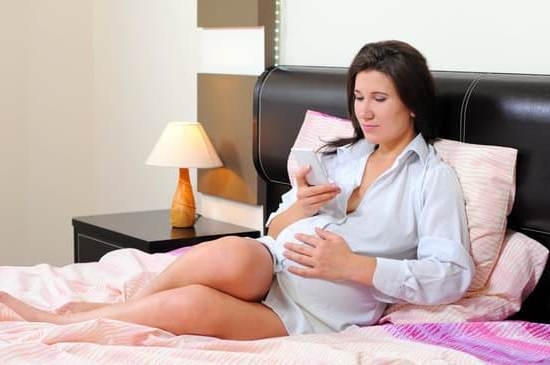Are cramps a sign of pregnancy? Many women wonder about this common question when they experience abdominal discomfort. In this article, we will delve into the topic of pregnancy cramps, exploring the different types, possible causes, and when to seek medical advice. Understanding the nature of cramps during pregnancy is important for expectant mothers to ensure the health and well-being of both themselves and their unborn child.
Pregnancy can bring about various physical changes, including cramping. It is important to understand the different types of cramps experienced during pregnancy and how they may differ from menstrual cramps. Additionally, we will discuss how early pregnancy cramps can start and provide tips for managing these discomforts.
Differentiating between menstrual and pregnancy cramps can be challenging for some women, so we will explore this topic in detail. By understanding the distinctive characteristics of each type of cramp, women can gain insight into whether they may be experiencing signs of pregnancy or simply typical menstrual discomfort. We will also discuss possible causes of pregnancy cramps and offer valuable advice on when to seek medical attention for such symptoms.
Types of Cramps Experienced During Pregnancy
Pregnancy can bring about a range of physical symptoms, including cramps. It’s important for expectant mothers to understand the different types of cramps they may experience throughout their pregnancy journey. Here are the common types of cramps experienced during pregnancy:
1. Round Ligament Pain: This type of cramp is common in the second trimester and feels like a sharp, stabbing pain or dull ache in the lower abdomen or groin area. These cramps occur as the ligaments that support the uterus stretch and expand to accommodate the growing baby.
2. Braxton Hicks Contractions: Often referred to as “practice contractions,” Braxton Hicks contractions are typically felt in the third trimester. These cramps feel like mild tightening or pressure in the abdomen and are a normal part of preparing the body for labor.
3. Implantation Cramping: Some women may experience cramping when the fertilized egg implants itself into the uterine lining, usually around 6-12 days after conception. This type of cramping is usually milder than menstrual cramps and may be accompanied by light spotting.
It’s important for pregnant women to be aware of these different types of cramps and how they manifest in order to differentiate them from other potential causes.
Overall, understanding the various types of cramps experienced during pregnancy can help expectant mothers better navigate their journey and know when it’s appropriate to seek medical advice if needed.
How Early Can Pregnancy Cramps Start
Pregnancy cramps can start as early as implantation, which typically occurs 6-12 days after fertilization. This is when the fertilized egg attaches to the lining of the uterus, causing mild cramping and spotting. These cramps are usually milder than menstrual cramps and may be accompanied by other early pregnancy symptoms such as breast tenderness, fatigue, and nausea.
As the pregnancy progresses, cramping may also occur as a result of the uterus expanding to accommodate the growing fetus. This type of cramping is usually described as a dull ache or pressure in the lower abdomen and is considered normal in most cases.
It’s important to note that every woman’s experience with pregnancy cramps is different, so while some may experience them very early on, others may not notice any cramping until later in their pregnancy.
| Types of Cramps Experienced During Pregnancy | Possible Causes of Cramps During Pregnancy |
|---|---|
| Implantation cramps | Uterus expanding to accommodate fetus |
| Round ligament pain | Gas or constipation |
| Braggton Hicks contractions | Dehydration or overexertion |
Differentiating Between Menstrual and Pregnancy Cramps
During the early stages of pregnancy, many women may experience cramps that can be mistaken for menstrual cramps. It is important to understand the differences between these two types of cramps in order to determine if the symptoms could be a sign of pregnancy.
Here are some key factors to consider when differentiating between menstrual and pregnancy cramps:
- Timeframe: Menstrual cramps typically occur just before or during menstruation, while pregnancy cramps can occur at various times during early pregnancy.
- Severity: Menstrual cramps are often mild to moderate in intensity, while pregnancy cramps can range from mild to severe.
- Duration: Menstrual cramps usually last for the duration of menstruation, while pregnancy cramps may come and go or persist for longer periods of time.
In addition to these factors, there are some specific characteristics of pregnancy cramps that can help differentiate them from menstrual cramps. For example, pregnancy cramps may be accompanied by other symptoms such as nausea, breast tenderness, and heightened sensitivity to smells. It is also important to consider whether there has been a change in menstrual cycle patterns or if there has been recent unprotected sexual activity that could result in pregnancy.
Overall, being aware of these differences and paying close attention to one’s own body can help determine whether the presence of cramps is a sign of pregnancy or something else. If there is any doubt or uncertainty, it is always best to consult with a healthcare provider for further evaluation and guidance.
Possible Causes of Cramps During Pregnancy
During pregnancy, it is common for women to experience cramps at various stages. These cramps can be caused by a variety of factors, and it is important for expectant mothers to understand the possible reasons behind them.
One of the most common causes of cramps during pregnancy is the stretching and expanding of the uterus as the baby grows. As the uterus expands, it puts pressure on the surrounding organs and ligaments, which can result in mild to moderate cramping sensations.
Another possible cause of pregnancy cramps is implantation. When a fertilized egg attaches itself to the lining of the uterus, some women may experience mild cramping and spotting. This typically occurs around the time of a woman’s expected period and may be mistaken for menstrual cramps. Additionally, hormonal changes during pregnancy can also contribute to cramping. Fluctuations in hormone levels can lead to increased uterine activity, which may cause discomfort or mild cramping sensations.
In some cases, more serious issues such as ectopic pregnancy or miscarriage may also cause abdominal pain or cramping during pregnancy. It’s important for expectant mothers to be aware of any abnormal symptoms or severe pain and seek medical advice if they experience intense or persistent cramps. While cramping alone may not always indicate a problem, being aware of potential causes can help women better understand their bodies during this crucial time.
When to Seek Medical Advice for Pregnancy Cramps
It is important for pregnant women to be aware of when to seek medical advice for pregnancy cramps. While some cramping can be normal during pregnancy, there are certain signs and symptoms that may indicate a more serious issue. Understanding when to seek medical help is crucial for the health and well-being of both the mother and the baby.
Signs You Should Seek Medical Advice
If you experience severe or persistent cramping, especially if it is accompanied by vaginal bleeding, it is important to contact your healthcare provider immediately. This could be a sign of a miscarriage or ectopic pregnancy, both of which require immediate medical attention. Additionally, if the cramps are accompanied by fever, chills, dizziness, or fainting, it is important to seek medical advice promptly.
When in Doubt, Contact Your Healthcare Provider
Even if you are unsure whether your cramps are cause for concern, it is always better to err on the side of caution and contact your healthcare provider. They can provide guidance and determine whether further evaluation or treatment is necessary. It is always best to address any worries or concerns about pregnancy cramps with a qualified medical professional.
Monitoring Your Symptoms
Throughout your pregnancy, it is important to monitor your symptoms and report any changes or concerns to your healthcare provider. Keeping track of the frequency, intensity, and duration of your cramps can help your provider assess whether they are normal or indicative of a potential problem. Open communication with your healthcare team can help ensure that any issues are addressed promptly and appropriately.
Tips for Managing Pregnancy Cramps
After learning about the different types of cramps and when they can start during pregnancy, it’s important to understand how to manage them effectively. Pregnancy cramps can be uncomfortable, but there are several tips and techniques that can help alleviate the discomfort and ensure a smoother pregnancy experience.
Stay Hydrated
One of the most important factors in managing pregnancy cramps is to stay well-hydrated. Dehydration can exacerbate muscle cramps, so drinking plenty of water throughout the day is essential. Aim for at least 8-10 glasses of water daily to keep your body properly hydrated and reduce the frequency and severity of cramps.
Gentle Exercise
Engaging in gentle exercises like prenatal yoga or swimming can help relieve pregnancy cramps. These low-impact activities can improve circulation, relax tense muscles, and reduce the likelihood of experiencing cramps. Always consult with your healthcare provider before starting any new exercise routine during pregnancy.
Proper Nutrition
Maintaining a balanced diet rich in essential nutrients like calcium, magnesium, and potassium can contribute to reducing pregnancy cramps. Incorporating foods such as leafy greens, dairy products, bananas, and nuts into your diet can help prevent muscle spasms and alleviate cramping sensations.
By incorporating these tips into your daily routine, you can effectively manage pregnancy cramps and enjoy a more comfortable pregnancy experience. However, if you experience severe or persistent cramping, it’s important to seek medical advice from your healthcare provider to rule out any potential complications.
Final Thoughts
As we conclude our discussion on pregnancy cramps, it is important to address the question: are cramps a sign of pregnancy? The answer is yes, cramps can indeed be a sign of pregnancy. While not all women experience cramping during early pregnancy, it is quite common for many to do so. These cramps can feel similar to menstrual cramps but may be milder and occur more sporadically.
It is important for women who suspect they may be pregnant and experience cramping to consult with their healthcare provider for confirmation. This is especially important for those who have a history of fertility issues or complications during previous pregnancies. Seeking medical advice can help provide peace of mind and ensure that any necessary prenatal care is received.
In conclusion, while experiencing cramps can cause concern for many women, it is important to remember that they can be a normal part of early pregnancy. By understanding the types of cramps experienced during pregnancy, differentiating between menstrual and pregnancy cramps, knowing when to seek medical advice, and learning how to manage these symptoms, women can navigate this aspect of their pregnancy journey with confidence and peace of mind.
Frequently Asked Questions
What Does Early Pregnancy Cramps Feel Like?
Early pregnancy cramps can feel like mild to moderate period-like cramping. Some women describe it as a dull ache or pulling sensation in the lower abdomen, similar to premenstrual cramps.
How Soon Do Cramps Start Before Pregnancy?
Cramps can start a week or two before a missed period in early pregnancy. These cramps are often one of the first signs of pregnancy, occurring around the time of implantation when the fertilized egg attaches to the uterine lining.
How Do I Know if My Cramps Are Period or Pregnancy?
Distinguishing between period and pregnancy cramps can be challenging, as they can feel quite similar. However, period cramps typically occur right before or during your menstrual cycle, while early pregnancy cramps may occur earlier and coincide with other symptoms such as breast tenderness, nausea, and a missed period. If in doubt, taking a pregnancy test can provide clarity.

Welcome to my fertility blog. This is a space where I will be sharing my experiences as I navigate through the world of fertility treatments, as well as provide information and resources about fertility and pregnancy.





